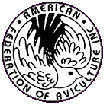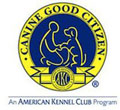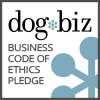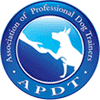Puppy Socialization: What it means and how to do it right
It’s not just a buzz word! Socialization simply means “learning to live in a society.” For dogs, this means learning to live in a human society, which takes some active effort on our part. Most young social animals are very receptive to new experiences, up to a certain age – later on, new experiences can be viewed as threatening (this makes biological sense, really – it’s survival of the fittest!)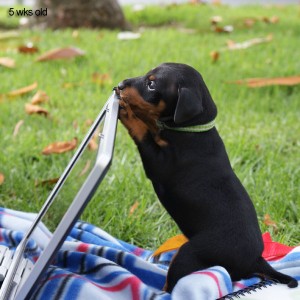
Dogs have a Primary Socialization Period, which spans from 3 weeks (when they begin to see, hear, and smell) to 12 weeks, and a Secondary Socialization Period, which spans from after 12 weeks for the rest of the dog’s life. The Primary Socialization Period is the one you always hear about (but that doesn’t mean that continued socialization throughout life isn’t important!)
Done properly, early puppy socialization helps your dog to grow up to be confident, calm and friendly around strange people, dogs and environments. Well-socialized dogs are less likely to bite or develop debilitating behavior problems. Early socialization also opens the gateway to additional socialization throughout life. If a dog isn’t exposed to enough stimuli during the primary socialization period, the secondary socialization period will be less effective, because the brain hasn’t developed enough capacity to be receptive to new experiences. This doesn’t mean all hope is lost; it just means you have to go about handling your dog in a very different way. Ask us for help!
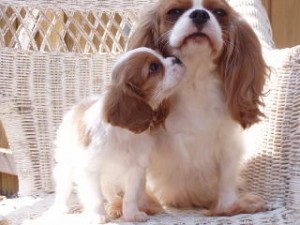 Puppy socialization should be done carefully, gently, and thoroughly. Animals learn by associating emotions with things; therefore, you want to make your puppy’s early experiences in the world happy and fun (hint: if your puppy is becoming increasingly fearful, he’s making the wrong emotional associations – STOP! Your pup should be gaining confidence, not losing it. Ask for help!).
Puppy socialization should be done carefully, gently, and thoroughly. Animals learn by associating emotions with things; therefore, you want to make your puppy’s early experiences in the world happy and fun (hint: if your puppy is becoming increasingly fearful, he’s making the wrong emotional associations – STOP! Your pup should be gaining confidence, not losing it. Ask for help!).
Notice that a puppy’s Primary Socialization Period ends before most dogs’ vaccination series are finished. This, admittedly, presents a problem. You must be very careful about which Puppy Kindergarten class you choose, and the big box stores should be a last resort.
Early experiences should above all be safe; DO NOT take a young puppy to the dog park!! Not all of those dogs are friendly. (Indeed, people with aggressive dogs often tell me they tried to take them to the dog park to “socialize” them – which is potentially very dangerous for your little pup!) Furthermore, there is no assurance that any of those dogs are healthy. Communicable diseases can reside in fecal matter or soil for years in some cases. Likewise, do not take your puppy to the pet store, or any area that is highly trafficked by dogs of unknown vaccination or disease status, until he’s done with his vaccination series. An excellent option for proper puppy socialization is a well run Puppy Kindergarten class. This is a class in a safe, controlled, clean environment designed specifically for little puppies who are in their critical socialization period and who haven’t finished their vaccination series. It should be indoors, include only puppies below a certain age whose vaccination records have been seen by the instructor, and should take place on flooring that can be sanitized. Our classes have an emphasis on basic manners, off-leash play (to develop proper body language skills and bite inhibition), and aggression prevention exercises.
Here are some safe socialization activities for puppies that have not completed their vaccination series:
- Take the puppy on car rides: to the mountains, through the drive-thru, to a friend’s house
- Invite your tall, short, fat, skinny, old, young, hat wearing, etc. friends over to your house to meet your puppy! Invite people of different races to meet your puppy if you can. (Bribe everyone with cake if you have to)
- Arrange playdates in your home with dogs who you know are well cared for, healthy, friendly, and polite
- Visit a local elementary school or playground and let your puppy watch the kids from the car. Bonus points if they’d like to give her some treats through the window!
